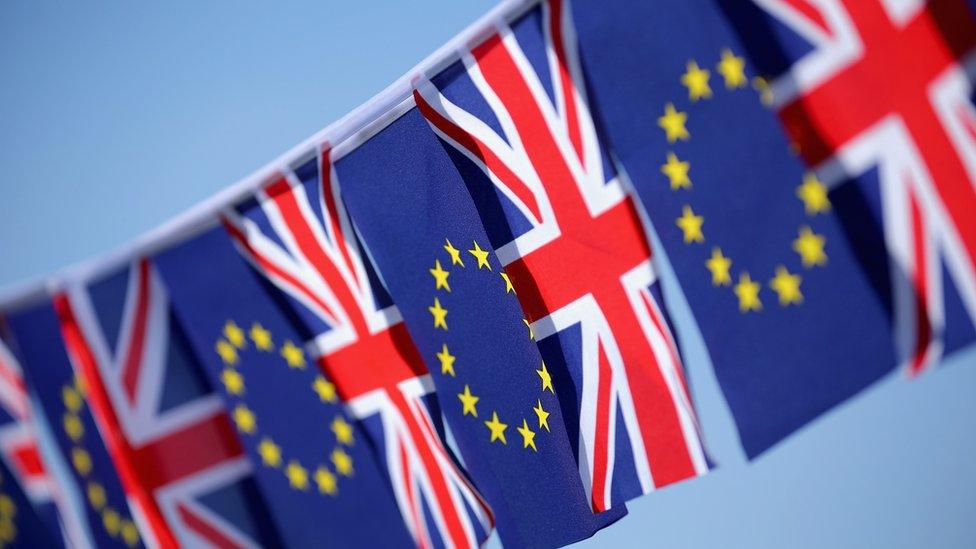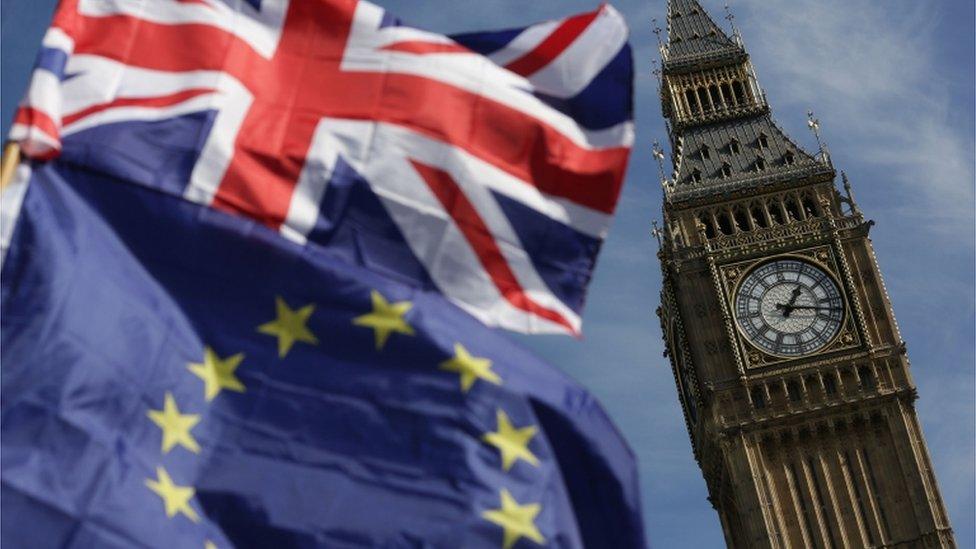Fox warns colleagues: 'We didn’t say we would part-leave the EU'
- Published
- comments
Nobody voted to “part leave” the European Union, says Dr Liam Fox
Out of the single market.
Out of the customs union.
Free of European Union laws.
Immigration under Westminster control.
If anyone was wondering whether the government might offer some substantial wriggle room on the Brexit negotiations to take account of the very different Parliamentary arithmetic following the general election, they have another think coming.
Dr Liam Fox, the cabinet minister for international trade, has told the BBC that nobody voted to "part-leave" the European Union.
The public either voted leave - which he takes to mean being out of the two substantive EU trading structures, the single market and the customs union - or remain, a vote to stay wholly in the union.
As leave won, Dr Fox argues, it is now time for the Conservatives to get on with it and deliver, even without a majority in Parliament.
"We have to go full steam ahead and get the job done," he told me, saying he didn't recognise the terms "hard" (fully out) and "soft" (partially out, or a delayed out) Brexit.
To coin a phrase, Brexit means Brexit.
And anyone, including Conservative MPs, sympathetic to a different approach - and who may feel emboldened by the election result - should remember the referendum outcome last year.
Dr Fox was speaking to me as part of a news special on BBC1 tonight at 8.30pm called Brexit: What's Next?
With colleague and Europe Editor, Katya Adler, it is an attempt to try to unpack what the remarkably close general election result means for Britain and the EU's approach to Brexit.
Dr Fox admits that getting the final Brexit deal through Parliament "won't be easier" after the Prime Minister lost her majority, but argues that Theresa May will stick to the position laid out before 8 June.
Which is fully out of the single market and the customs union.

There may be transitional arrangements as Britain moves to a new trading relationship with the EU, but Dr Fox refused to be drawn on how long that would be.
"How long is a piece of string?" he answered, after I put to him the former business secretary Sir Vince Cable's suggestion that it could be a decade before any final deal is completed.
I don't think that means Dr Fox is relaxed about how long any "transition" may take - he wants the deal done as quickly as possible.
But he does believe a "cliff edge" departure should be avoided - which may take some time, although how long, for Dr Fox, is still unclear.
"The British public made a decision to leave," Dr Fox told me.
"We have to honour that decision to leave.
"We didn't say we would part-leave the European Union.
"[The public] gave us an instruction to do so and anybody who is a democrat needs to follow that instruction.
"If we want to get what the British public voted for in the referendum - control of our laws, control of our borders, control of our money - then we have to have an exit which takes us outside the single market and outside the customs union - although we will want to maximise our ability to trade inside that market."
No 'white flag'
He said that the option of "no deal" had to be left on the table.
"What are these people actually saying to us?" Dr Fox said of those who say that "no deal" should be off the table.
"Are they saying that we should seriously go into a negotiation and saying whatever deal is offered we would accept that rather than walk away?
"I mean what sort of a negotiation actually would that be?
"It's effectively waving the white flag before the negotiations actually begin.
"It is not a sensible position for us to have
"But we don't want to get to no deal.
"We've set out the sort of deal that we want, a deal that's good for European citizens in the United Kingdom and British citizens in the European Union; that's good for British business, that enables us to trade maximally with the single market; that means there's as little friction at our borders as possible, giving Britain simultaneously the freedom to develop new trading agreements elsewhere."
Of course staying in the customs union - which would prevent Britain signing its own trade deals with countries outside the EU - would effectively make Dr Fox's department superfluous.
'Jobs and prosperity'
Dr Fox may not like the distinction between "hard" and "soft", but Philip Hammond, the Chancellor, is judged to have a rather different approach ("soft", if you like) to the type of deal Britain may strike with the EU, as I wrote last month.
And, for this BBC1 news special, both Sir Vince, who is standing to be leader of the Liberal Democrats, and Sir Keir Starmer, Labour's shadow secretary for exiting the EU, said they might be willing to join forces with Mr Hammond to put "jobs and prosperity" at the heart of the negotiations.
Dr Fox says that is a false division - and that the future prosperity of the UK is at the heart of his approach to Brexit.
Britain can be strong economically outside the EU, he says, despite the myriad of warnings that leaving the single market and the customs union could damage the UK economy.
"If you are looking at a free trade agreement in a global context, this one with the European Union ought to be the simplest in the history of mankind because we're beginning from a completely tariff free basis and we're beginning with exactly the same laws and regulations as the rest of our European partners," Dr Fox said.
"And the only reason that we'll not get to this perfect arrangement would be if the politics of Europe got in the way.
"That would be a pity because it would just say that they were putting the politics of Europe above the prosperity of Europe."
And on the chance of Britain ever staying in the EU - as some EU leaders have rather wistfully suggested - Dr Fox has a straightforward answer.
"There's about as much chance of us staying in the European Union as of me finding the tooth fairy."
- Published26 June 2017

- Published25 June 2017

- Published30 December 2020

